Comprehensive People Management Report: NHS Strategies and Insights
VerifiedAdded on 2023/01/18
|9
|2530
|59
Report
AI Summary
This report provides an in-depth analysis of people management within the National Health Service (NHS), a large public sector organization. It examines key areas such as leadership and management, training and development, and talent management. The report explores the operational context of the NHS, relevant theoretical models like transformational leadership and experiential learning, and provides recommendations for improving employee skills and behaviors. It emphasizes the importance of effective leadership, training programs, and talent retention strategies for achieving the NHS's operational goals. The report highlights the need for managers to possess specific knowledge, skills, and behaviors in each area to ensure successful people management practices within the healthcare setting. The conclusion summarizes the findings and underscores the significance of applying relevant theories to optimize employee performance and organizational success.
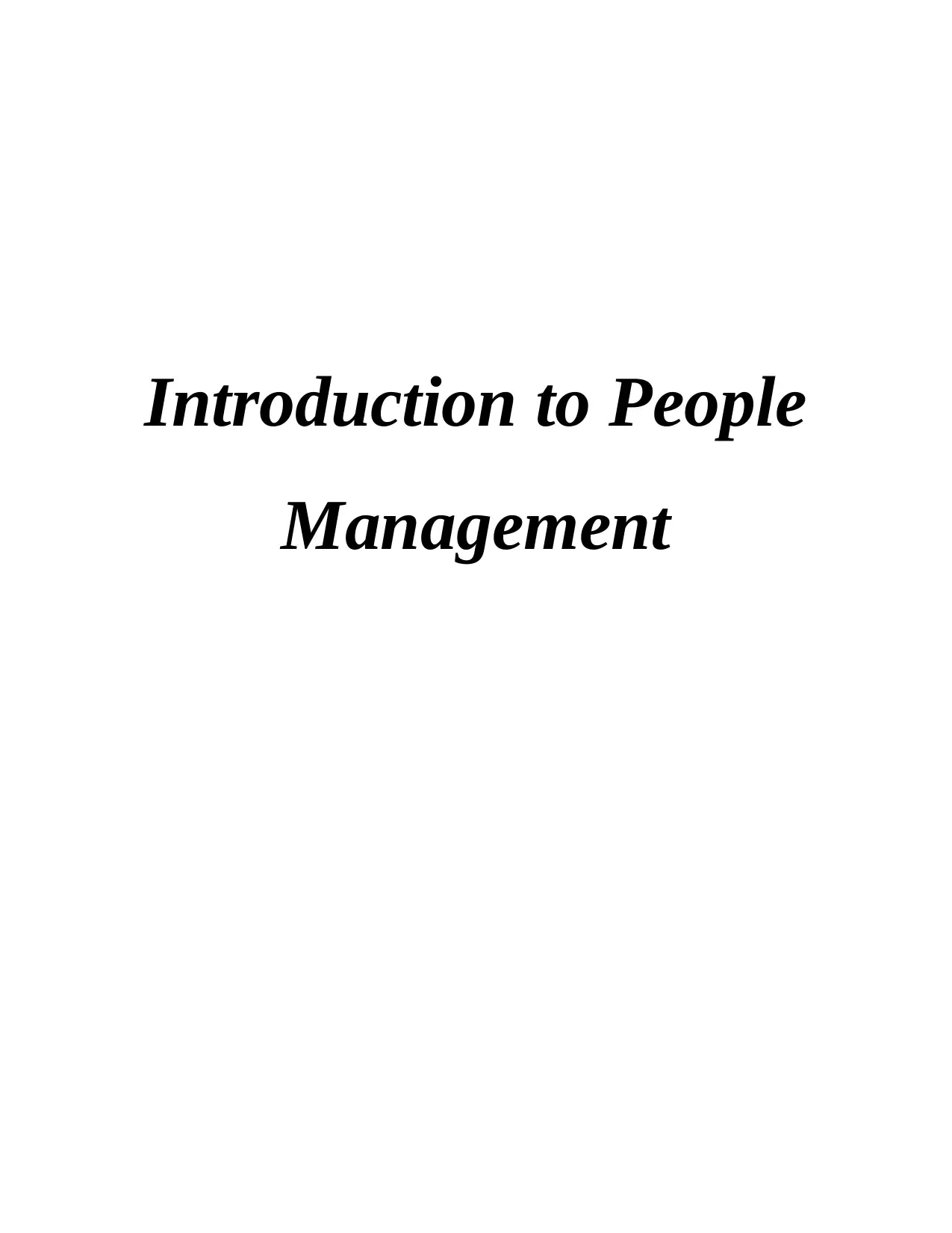
Introduction to People
Management
Management
Paraphrase This Document
Need a fresh take? Get an instant paraphrase of this document with our AI Paraphraser
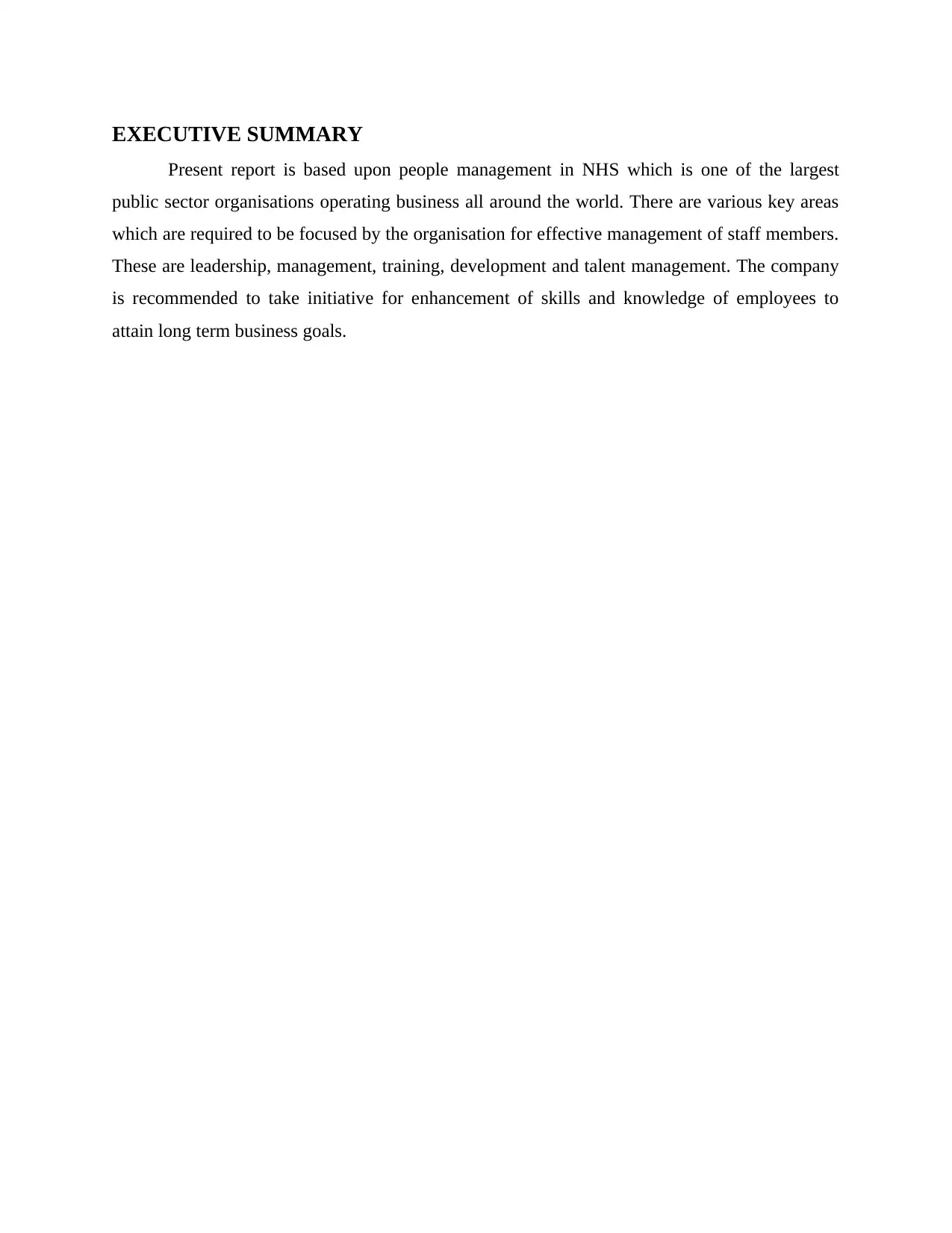
EXECUTIVE SUMMARY
Present report is based upon people management in NHS which is one of the largest
public sector organisations operating business all around the world. There are various key areas
which are required to be focused by the organisation for effective management of staff members.
These are leadership, management, training, development and talent management. The company
is recommended to take initiative for enhancement of skills and knowledge of employees to
attain long term business goals.
Present report is based upon people management in NHS which is one of the largest
public sector organisations operating business all around the world. There are various key areas
which are required to be focused by the organisation for effective management of staff members.
These are leadership, management, training, development and talent management. The company
is recommended to take initiative for enhancement of skills and knowledge of employees to
attain long term business goals.
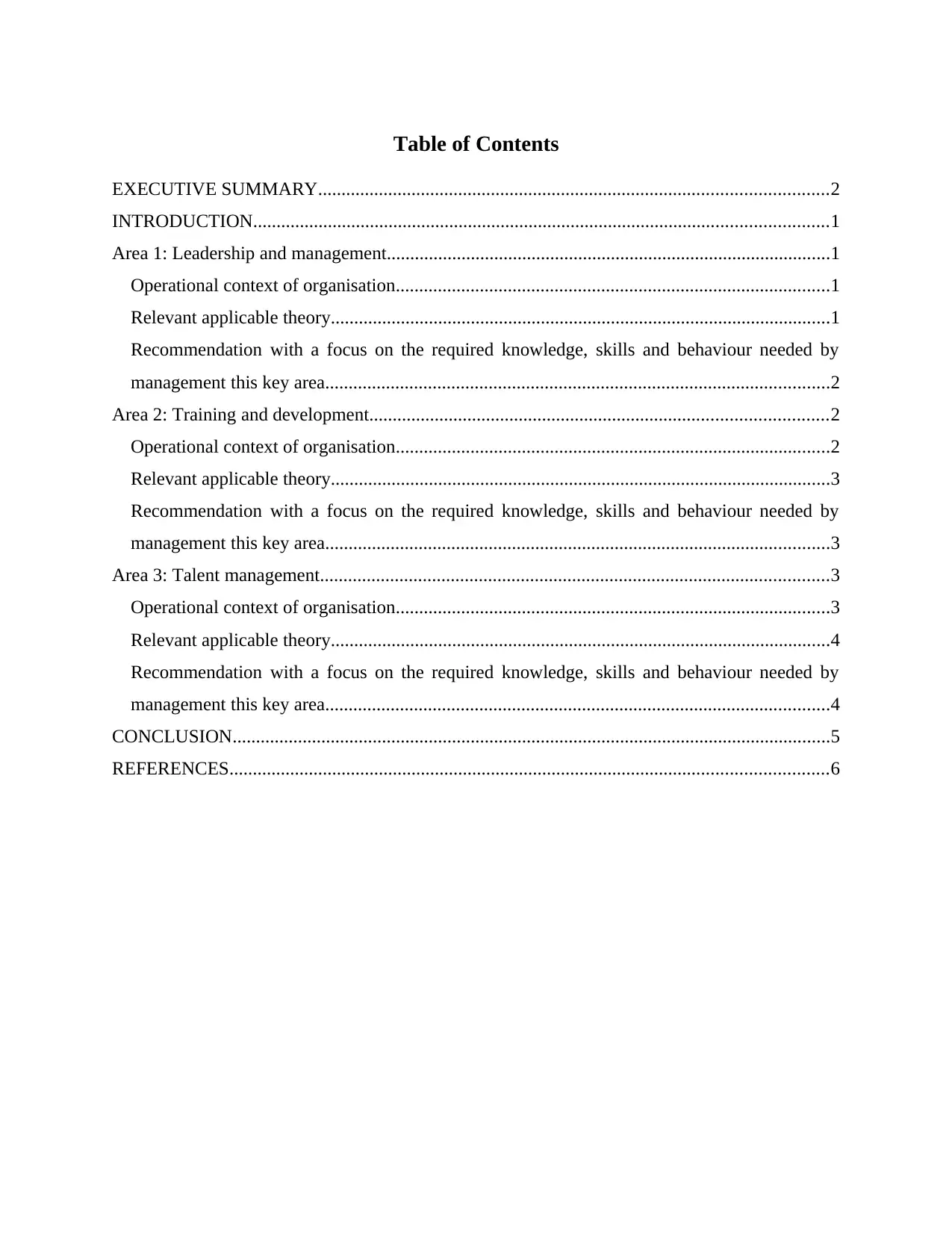
Table of Contents
EXECUTIVE SUMMARY.............................................................................................................2
INTRODUCTION...........................................................................................................................1
Area 1: Leadership and management...............................................................................................1
Operational context of organisation.............................................................................................1
Relevant applicable theory...........................................................................................................1
Recommendation with a focus on the required knowledge, skills and behaviour needed by
management this key area............................................................................................................2
Area 2: Training and development..................................................................................................2
Operational context of organisation.............................................................................................2
Relevant applicable theory...........................................................................................................3
Recommendation with a focus on the required knowledge, skills and behaviour needed by
management this key area............................................................................................................3
Area 3: Talent management.............................................................................................................3
Operational context of organisation.............................................................................................3
Relevant applicable theory...........................................................................................................4
Recommendation with a focus on the required knowledge, skills and behaviour needed by
management this key area............................................................................................................4
CONCLUSION................................................................................................................................5
REFERENCES................................................................................................................................6
EXECUTIVE SUMMARY.............................................................................................................2
INTRODUCTION...........................................................................................................................1
Area 1: Leadership and management...............................................................................................1
Operational context of organisation.............................................................................................1
Relevant applicable theory...........................................................................................................1
Recommendation with a focus on the required knowledge, skills and behaviour needed by
management this key area............................................................................................................2
Area 2: Training and development..................................................................................................2
Operational context of organisation.............................................................................................2
Relevant applicable theory...........................................................................................................3
Recommendation with a focus on the required knowledge, skills and behaviour needed by
management this key area............................................................................................................3
Area 3: Talent management.............................................................................................................3
Operational context of organisation.............................................................................................3
Relevant applicable theory...........................................................................................................4
Recommendation with a focus on the required knowledge, skills and behaviour needed by
management this key area............................................................................................................4
CONCLUSION................................................................................................................................5
REFERENCES................................................................................................................................6
⊘ This is a preview!⊘
Do you want full access?
Subscribe today to unlock all pages.

Trusted by 1+ million students worldwide
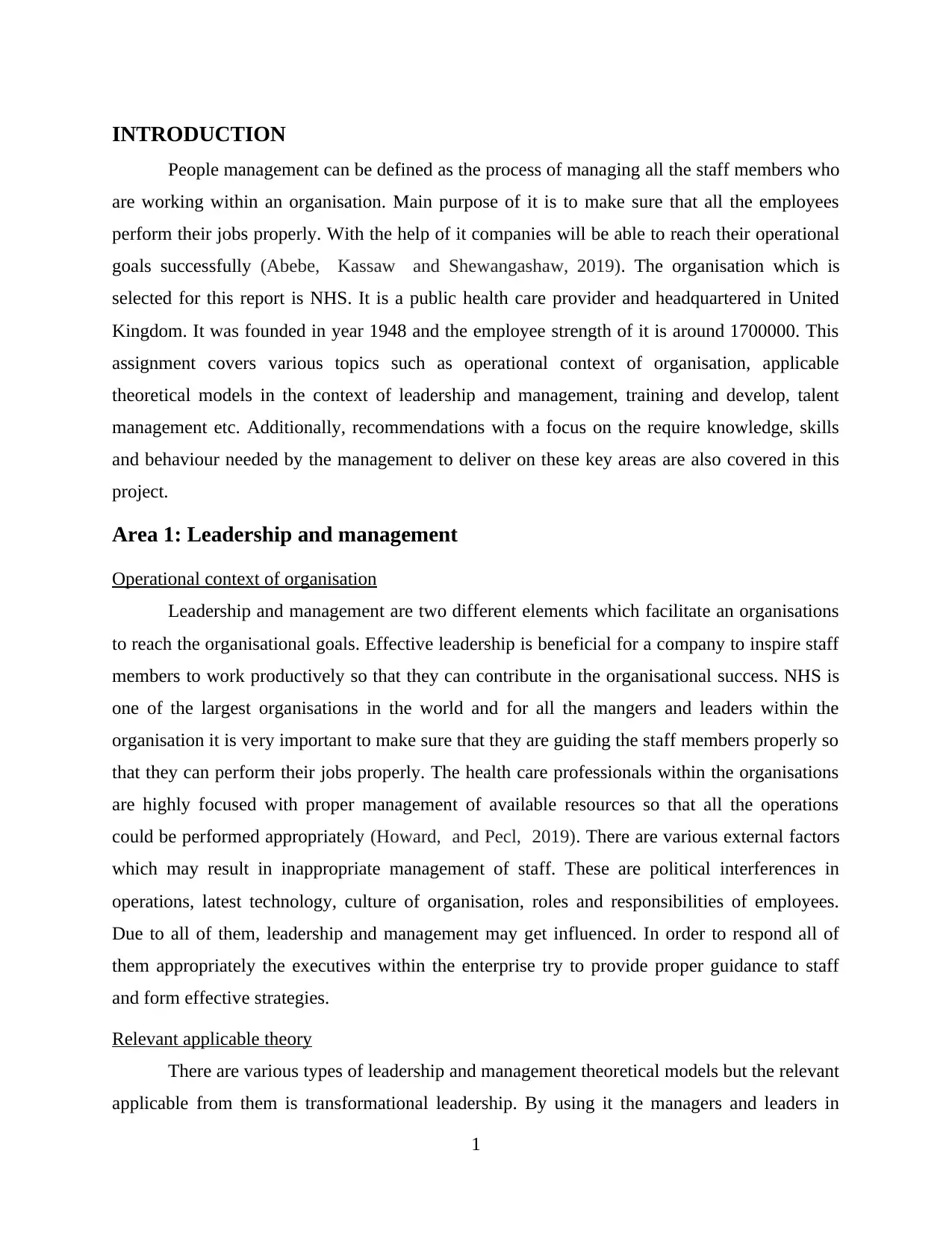
INTRODUCTION
People management can be defined as the process of managing all the staff members who
are working within an organisation. Main purpose of it is to make sure that all the employees
perform their jobs properly. With the help of it companies will be able to reach their operational
goals successfully (Abebe, Kassaw and Shewangashaw, 2019). The organisation which is
selected for this report is NHS. It is a public health care provider and headquartered in United
Kingdom. It was founded in year 1948 and the employee strength of it is around 1700000. This
assignment covers various topics such as operational context of organisation, applicable
theoretical models in the context of leadership and management, training and develop, talent
management etc. Additionally, recommendations with a focus on the require knowledge, skills
and behaviour needed by the management to deliver on these key areas are also covered in this
project.
Area 1: Leadership and management
Operational context of organisation
Leadership and management are two different elements which facilitate an organisations
to reach the organisational goals. Effective leadership is beneficial for a company to inspire staff
members to work productively so that they can contribute in the organisational success. NHS is
one of the largest organisations in the world and for all the mangers and leaders within the
organisation it is very important to make sure that they are guiding the staff members properly so
that they can perform their jobs properly. The health care professionals within the organisations
are highly focused with proper management of available resources so that all the operations
could be performed appropriately (Howard, and Pecl, 2019). There are various external factors
which may result in inappropriate management of staff. These are political interferences in
operations, latest technology, culture of organisation, roles and responsibilities of employees.
Due to all of them, leadership and management may get influenced. In order to respond all of
them appropriately the executives within the enterprise try to provide proper guidance to staff
and form effective strategies.
Relevant applicable theory
There are various types of leadership and management theoretical models but the relevant
applicable from them is transformational leadership. By using it the managers and leaders in
1
People management can be defined as the process of managing all the staff members who
are working within an organisation. Main purpose of it is to make sure that all the employees
perform their jobs properly. With the help of it companies will be able to reach their operational
goals successfully (Abebe, Kassaw and Shewangashaw, 2019). The organisation which is
selected for this report is NHS. It is a public health care provider and headquartered in United
Kingdom. It was founded in year 1948 and the employee strength of it is around 1700000. This
assignment covers various topics such as operational context of organisation, applicable
theoretical models in the context of leadership and management, training and develop, talent
management etc. Additionally, recommendations with a focus on the require knowledge, skills
and behaviour needed by the management to deliver on these key areas are also covered in this
project.
Area 1: Leadership and management
Operational context of organisation
Leadership and management are two different elements which facilitate an organisations
to reach the organisational goals. Effective leadership is beneficial for a company to inspire staff
members to work productively so that they can contribute in the organisational success. NHS is
one of the largest organisations in the world and for all the mangers and leaders within the
organisation it is very important to make sure that they are guiding the staff members properly so
that they can perform their jobs properly. The health care professionals within the organisations
are highly focused with proper management of available resources so that all the operations
could be performed appropriately (Howard, and Pecl, 2019). There are various external factors
which may result in inappropriate management of staff. These are political interferences in
operations, latest technology, culture of organisation, roles and responsibilities of employees.
Due to all of them, leadership and management may get influenced. In order to respond all of
them appropriately the executives within the enterprise try to provide proper guidance to staff
and form effective strategies.
Relevant applicable theory
There are various types of leadership and management theoretical models but the relevant
applicable from them is transformational leadership. By using it the managers and leaders in
1
Paraphrase This Document
Need a fresh take? Get an instant paraphrase of this document with our AI Paraphraser
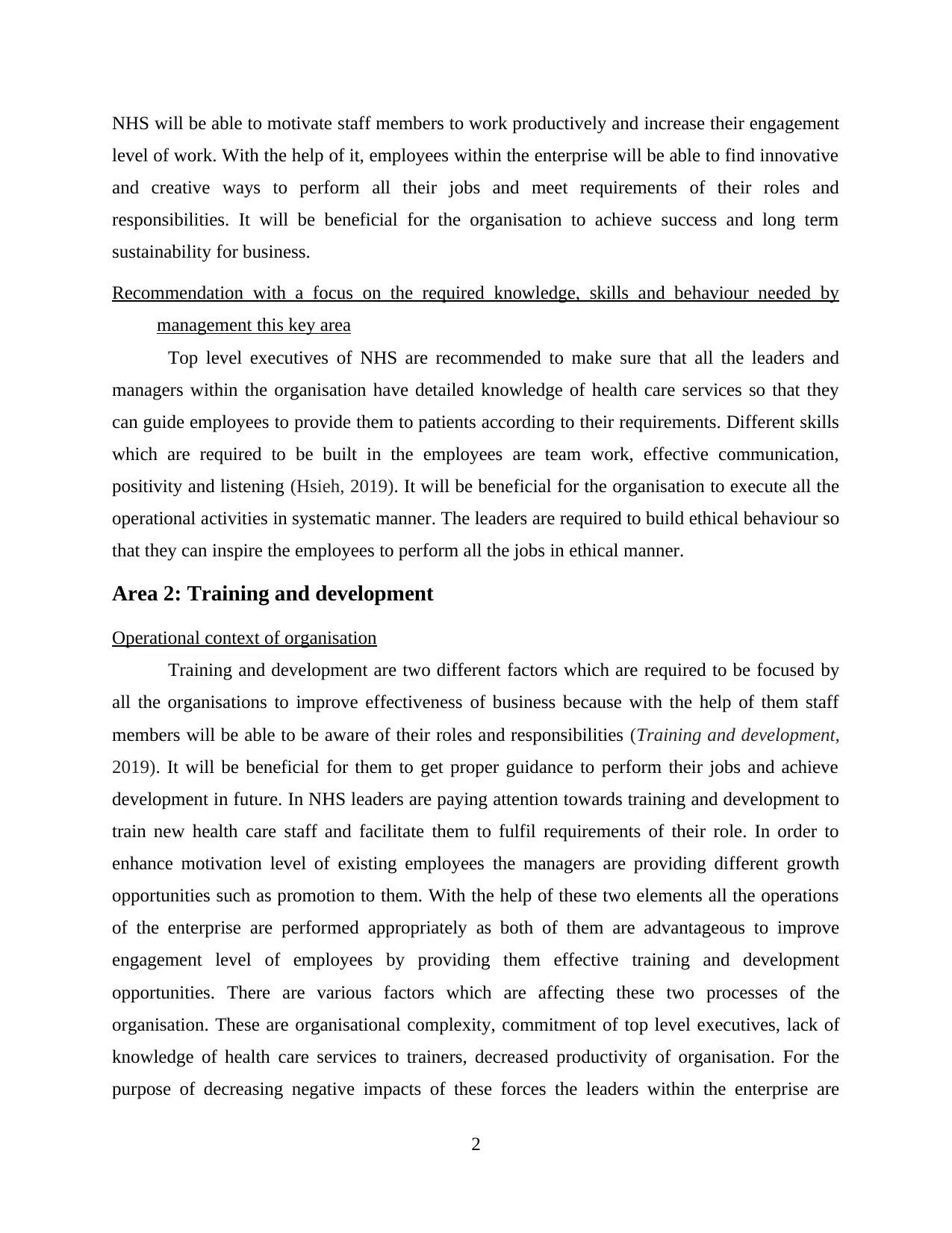
NHS will be able to motivate staff members to work productively and increase their engagement
level of work. With the help of it, employees within the enterprise will be able to find innovative
and creative ways to perform all their jobs and meet requirements of their roles and
responsibilities. It will be beneficial for the organisation to achieve success and long term
sustainability for business.
Recommendation with a focus on the required knowledge, skills and behaviour needed by
management this key area
Top level executives of NHS are recommended to make sure that all the leaders and
managers within the organisation have detailed knowledge of health care services so that they
can guide employees to provide them to patients according to their requirements. Different skills
which are required to be built in the employees are team work, effective communication,
positivity and listening (Hsieh, 2019). It will be beneficial for the organisation to execute all the
operational activities in systematic manner. The leaders are required to build ethical behaviour so
that they can inspire the employees to perform all the jobs in ethical manner.
Area 2: Training and development
Operational context of organisation
Training and development are two different factors which are required to be focused by
all the organisations to improve effectiveness of business because with the help of them staff
members will be able to be aware of their roles and responsibilities (Training and development,
2019). It will be beneficial for them to get proper guidance to perform their jobs and achieve
development in future. In NHS leaders are paying attention towards training and development to
train new health care staff and facilitate them to fulfil requirements of their role. In order to
enhance motivation level of existing employees the managers are providing different growth
opportunities such as promotion to them. With the help of these two elements all the operations
of the enterprise are performed appropriately as both of them are advantageous to improve
engagement level of employees by providing them effective training and development
opportunities. There are various factors which are affecting these two processes of the
organisation. These are organisational complexity, commitment of top level executives, lack of
knowledge of health care services to trainers, decreased productivity of organisation. For the
purpose of decreasing negative impacts of these forces the leaders within the enterprise are
2
level of work. With the help of it, employees within the enterprise will be able to find innovative
and creative ways to perform all their jobs and meet requirements of their roles and
responsibilities. It will be beneficial for the organisation to achieve success and long term
sustainability for business.
Recommendation with a focus on the required knowledge, skills and behaviour needed by
management this key area
Top level executives of NHS are recommended to make sure that all the leaders and
managers within the organisation have detailed knowledge of health care services so that they
can guide employees to provide them to patients according to their requirements. Different skills
which are required to be built in the employees are team work, effective communication,
positivity and listening (Hsieh, 2019). It will be beneficial for the organisation to execute all the
operational activities in systematic manner. The leaders are required to build ethical behaviour so
that they can inspire the employees to perform all the jobs in ethical manner.
Area 2: Training and development
Operational context of organisation
Training and development are two different factors which are required to be focused by
all the organisations to improve effectiveness of business because with the help of them staff
members will be able to be aware of their roles and responsibilities (Training and development,
2019). It will be beneficial for them to get proper guidance to perform their jobs and achieve
development in future. In NHS leaders are paying attention towards training and development to
train new health care staff and facilitate them to fulfil requirements of their role. In order to
enhance motivation level of existing employees the managers are providing different growth
opportunities such as promotion to them. With the help of these two elements all the operations
of the enterprise are performed appropriately as both of them are advantageous to improve
engagement level of employees by providing them effective training and development
opportunities. There are various factors which are affecting these two processes of the
organisation. These are organisational complexity, commitment of top level executives, lack of
knowledge of health care services to trainers, decreased productivity of organisation. For the
purpose of decreasing negative impacts of these forces the leaders within the enterprise are
2
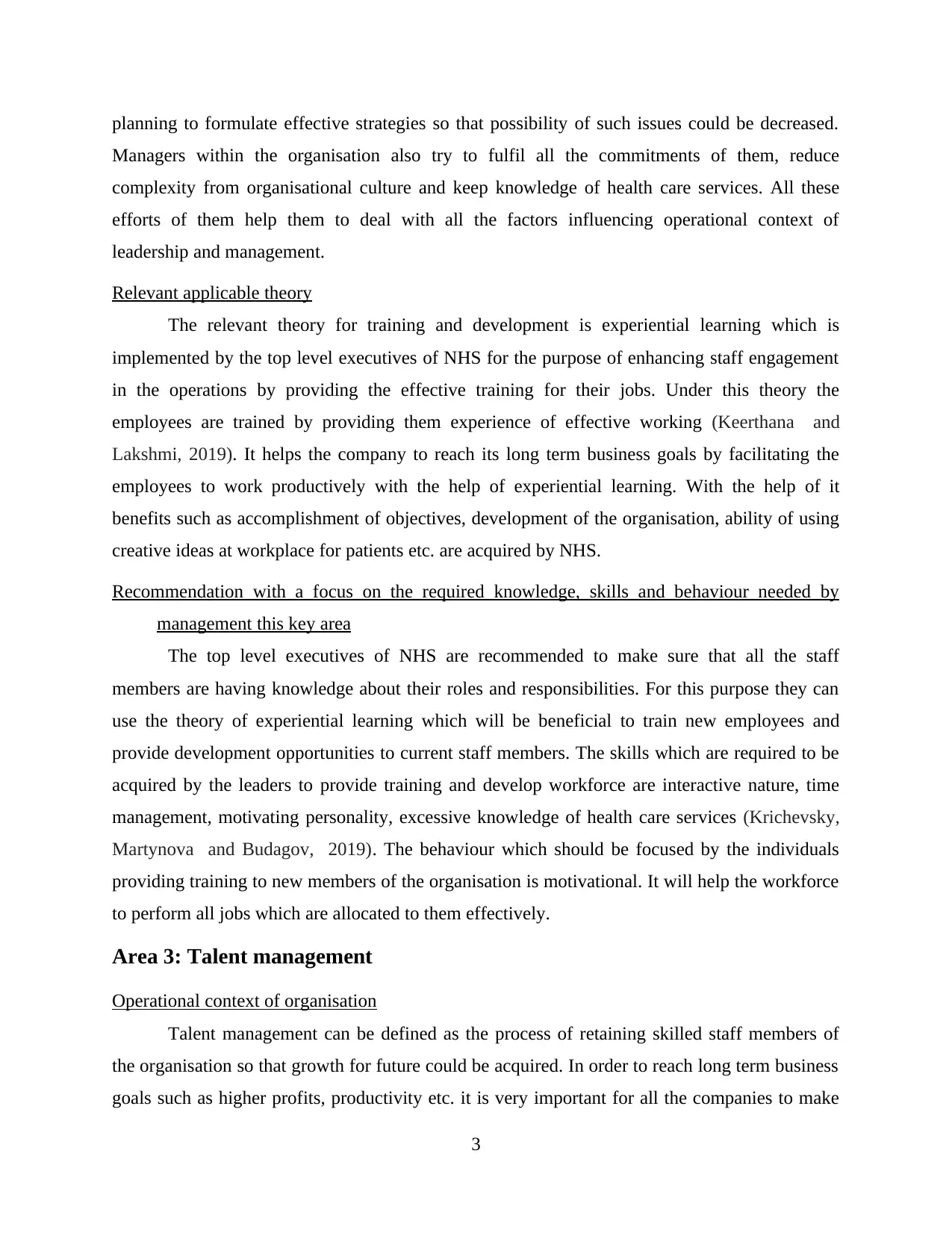
planning to formulate effective strategies so that possibility of such issues could be decreased.
Managers within the organisation also try to fulfil all the commitments of them, reduce
complexity from organisational culture and keep knowledge of health care services. All these
efforts of them help them to deal with all the factors influencing operational context of
leadership and management.
Relevant applicable theory
The relevant theory for training and development is experiential learning which is
implemented by the top level executives of NHS for the purpose of enhancing staff engagement
in the operations by providing the effective training for their jobs. Under this theory the
employees are trained by providing them experience of effective working (Keerthana and
Lakshmi, 2019). It helps the company to reach its long term business goals by facilitating the
employees to work productively with the help of experiential learning. With the help of it
benefits such as accomplishment of objectives, development of the organisation, ability of using
creative ideas at workplace for patients etc. are acquired by NHS.
Recommendation with a focus on the required knowledge, skills and behaviour needed by
management this key area
The top level executives of NHS are recommended to make sure that all the staff
members are having knowledge about their roles and responsibilities. For this purpose they can
use the theory of experiential learning which will be beneficial to train new employees and
provide development opportunities to current staff members. The skills which are required to be
acquired by the leaders to provide training and develop workforce are interactive nature, time
management, motivating personality, excessive knowledge of health care services (Krichevsky,
Martynova and Budagov, 2019). The behaviour which should be focused by the individuals
providing training to new members of the organisation is motivational. It will help the workforce
to perform all jobs which are allocated to them effectively.
Area 3: Talent management
Operational context of organisation
Talent management can be defined as the process of retaining skilled staff members of
the organisation so that growth for future could be acquired. In order to reach long term business
goals such as higher profits, productivity etc. it is very important for all the companies to make
3
Managers within the organisation also try to fulfil all the commitments of them, reduce
complexity from organisational culture and keep knowledge of health care services. All these
efforts of them help them to deal with all the factors influencing operational context of
leadership and management.
Relevant applicable theory
The relevant theory for training and development is experiential learning which is
implemented by the top level executives of NHS for the purpose of enhancing staff engagement
in the operations by providing the effective training for their jobs. Under this theory the
employees are trained by providing them experience of effective working (Keerthana and
Lakshmi, 2019). It helps the company to reach its long term business goals by facilitating the
employees to work productively with the help of experiential learning. With the help of it
benefits such as accomplishment of objectives, development of the organisation, ability of using
creative ideas at workplace for patients etc. are acquired by NHS.
Recommendation with a focus on the required knowledge, skills and behaviour needed by
management this key area
The top level executives of NHS are recommended to make sure that all the staff
members are having knowledge about their roles and responsibilities. For this purpose they can
use the theory of experiential learning which will be beneficial to train new employees and
provide development opportunities to current staff members. The skills which are required to be
acquired by the leaders to provide training and develop workforce are interactive nature, time
management, motivating personality, excessive knowledge of health care services (Krichevsky,
Martynova and Budagov, 2019). The behaviour which should be focused by the individuals
providing training to new members of the organisation is motivational. It will help the workforce
to perform all jobs which are allocated to them effectively.
Area 3: Talent management
Operational context of organisation
Talent management can be defined as the process of retaining skilled staff members of
the organisation so that growth for future could be acquired. In order to reach long term business
goals such as higher profits, productivity etc. it is very important for all the companies to make
3
⊘ This is a preview!⊘
Do you want full access?
Subscribe today to unlock all pages.

Trusted by 1+ million students worldwide
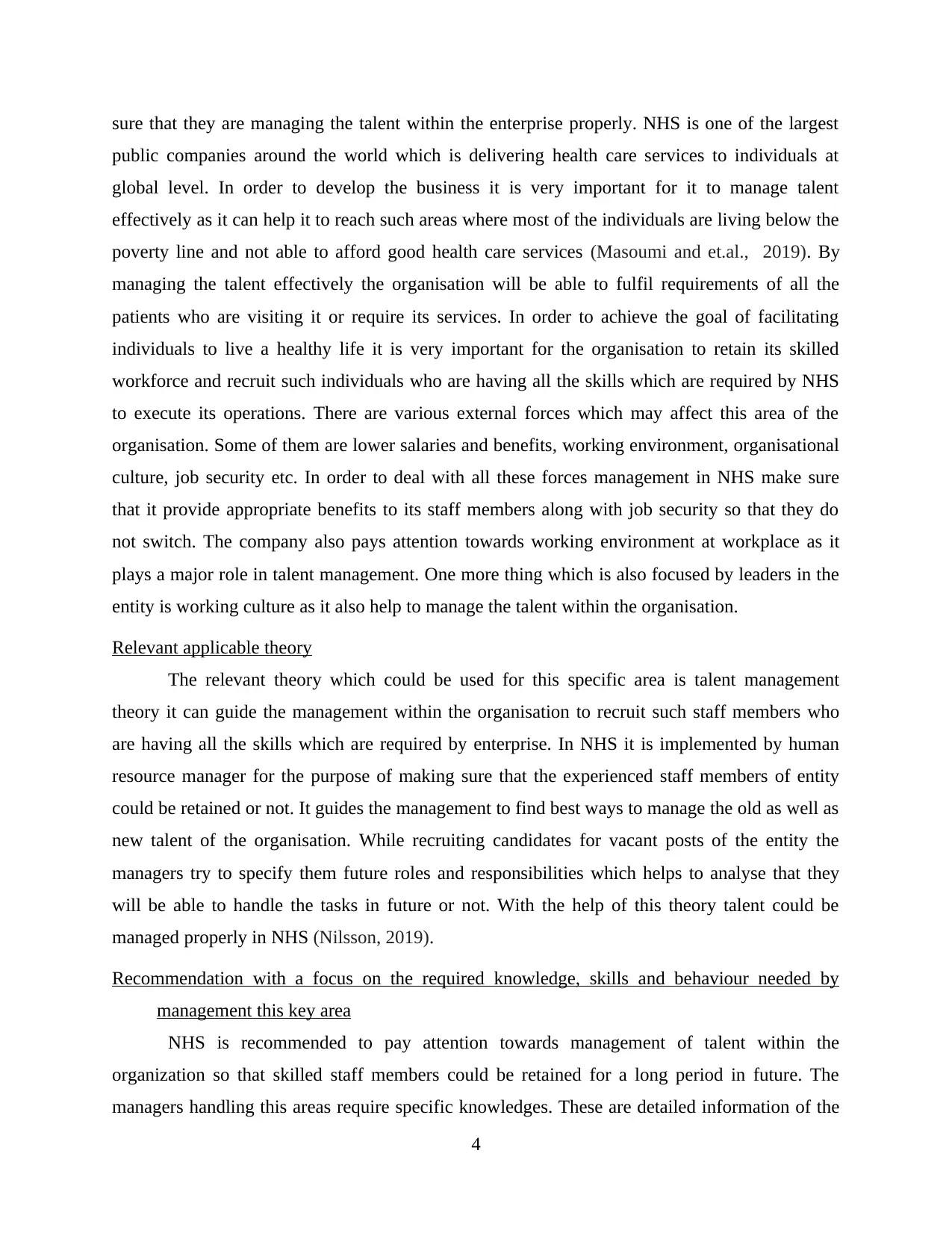
sure that they are managing the talent within the enterprise properly. NHS is one of the largest
public companies around the world which is delivering health care services to individuals at
global level. In order to develop the business it is very important for it to manage talent
effectively as it can help it to reach such areas where most of the individuals are living below the
poverty line and not able to afford good health care services (Masoumi and et.al., 2019). By
managing the talent effectively the organisation will be able to fulfil requirements of all the
patients who are visiting it or require its services. In order to achieve the goal of facilitating
individuals to live a healthy life it is very important for the organisation to retain its skilled
workforce and recruit such individuals who are having all the skills which are required by NHS
to execute its operations. There are various external forces which may affect this area of the
organisation. Some of them are lower salaries and benefits, working environment, organisational
culture, job security etc. In order to deal with all these forces management in NHS make sure
that it provide appropriate benefits to its staff members along with job security so that they do
not switch. The company also pays attention towards working environment at workplace as it
plays a major role in talent management. One more thing which is also focused by leaders in the
entity is working culture as it also help to manage the talent within the organisation.
Relevant applicable theory
The relevant theory which could be used for this specific area is talent management
theory it can guide the management within the organisation to recruit such staff members who
are having all the skills which are required by enterprise. In NHS it is implemented by human
resource manager for the purpose of making sure that the experienced staff members of entity
could be retained or not. It guides the management to find best ways to manage the old as well as
new talent of the organisation. While recruiting candidates for vacant posts of the entity the
managers try to specify them future roles and responsibilities which helps to analyse that they
will be able to handle the tasks in future or not. With the help of this theory talent could be
managed properly in NHS (Nilsson, 2019).
Recommendation with a focus on the required knowledge, skills and behaviour needed by
management this key area
NHS is recommended to pay attention towards management of talent within the
organization so that skilled staff members could be retained for a long period in future. The
managers handling this areas require specific knowledges. These are detailed information of the
4
public companies around the world which is delivering health care services to individuals at
global level. In order to develop the business it is very important for it to manage talent
effectively as it can help it to reach such areas where most of the individuals are living below the
poverty line and not able to afford good health care services (Masoumi and et.al., 2019). By
managing the talent effectively the organisation will be able to fulfil requirements of all the
patients who are visiting it or require its services. In order to achieve the goal of facilitating
individuals to live a healthy life it is very important for the organisation to retain its skilled
workforce and recruit such individuals who are having all the skills which are required by NHS
to execute its operations. There are various external forces which may affect this area of the
organisation. Some of them are lower salaries and benefits, working environment, organisational
culture, job security etc. In order to deal with all these forces management in NHS make sure
that it provide appropriate benefits to its staff members along with job security so that they do
not switch. The company also pays attention towards working environment at workplace as it
plays a major role in talent management. One more thing which is also focused by leaders in the
entity is working culture as it also help to manage the talent within the organisation.
Relevant applicable theory
The relevant theory which could be used for this specific area is talent management
theory it can guide the management within the organisation to recruit such staff members who
are having all the skills which are required by enterprise. In NHS it is implemented by human
resource manager for the purpose of making sure that the experienced staff members of entity
could be retained or not. It guides the management to find best ways to manage the old as well as
new talent of the organisation. While recruiting candidates for vacant posts of the entity the
managers try to specify them future roles and responsibilities which helps to analyse that they
will be able to handle the tasks in future or not. With the help of this theory talent could be
managed properly in NHS (Nilsson, 2019).
Recommendation with a focus on the required knowledge, skills and behaviour needed by
management this key area
NHS is recommended to pay attention towards management of talent within the
organization so that skilled staff members could be retained for a long period in future. The
managers handling this areas require specific knowledges. These are detailed information of the
4
Paraphrase This Document
Need a fresh take? Get an instant paraphrase of this document with our AI Paraphraser
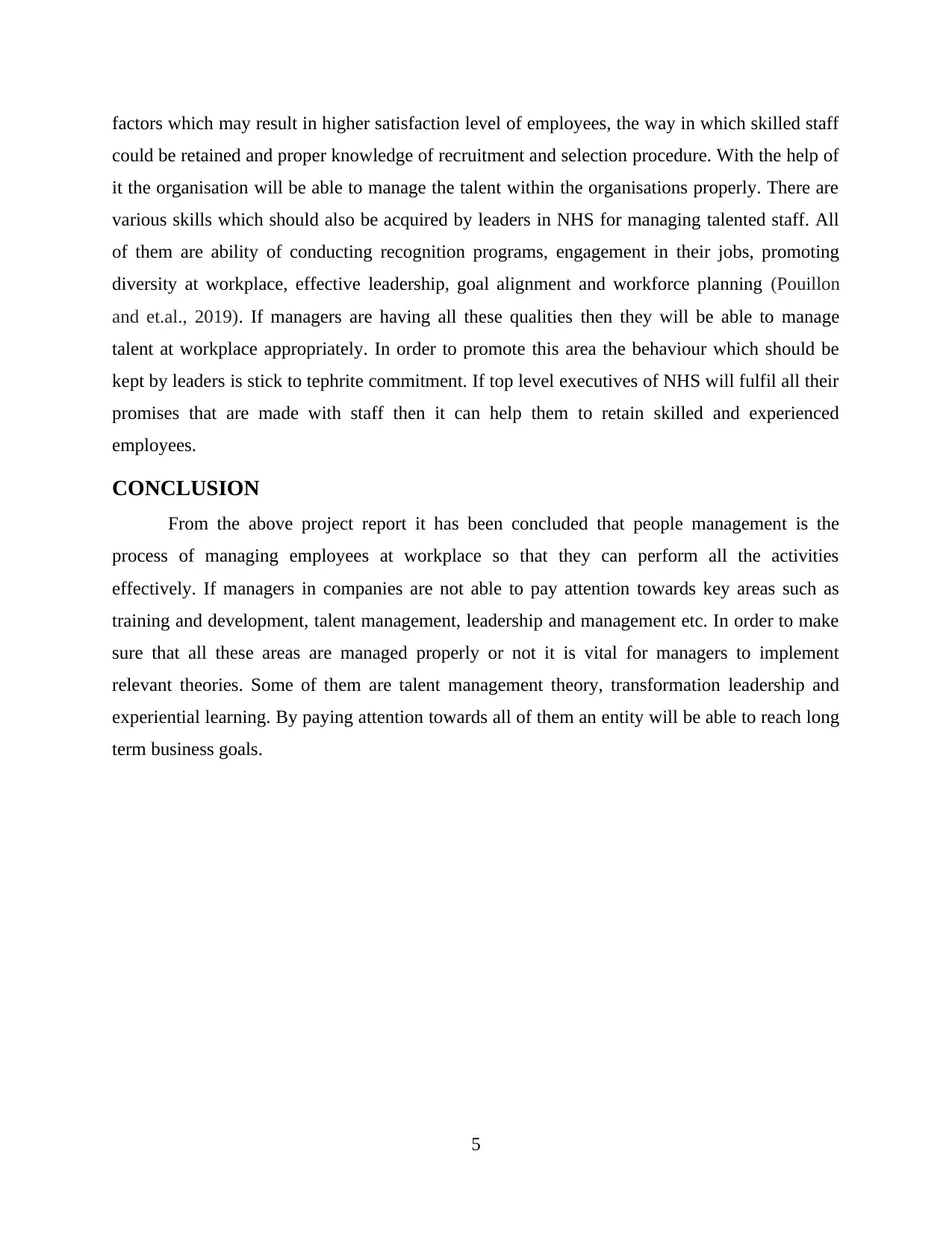
factors which may result in higher satisfaction level of employees, the way in which skilled staff
could be retained and proper knowledge of recruitment and selection procedure. With the help of
it the organisation will be able to manage the talent within the organisations properly. There are
various skills which should also be acquired by leaders in NHS for managing talented staff. All
of them are ability of conducting recognition programs, engagement in their jobs, promoting
diversity at workplace, effective leadership, goal alignment and workforce planning (Pouillon
and et.al., 2019). If managers are having all these qualities then they will be able to manage
talent at workplace appropriately. In order to promote this area the behaviour which should be
kept by leaders is stick to tephrite commitment. If top level executives of NHS will fulfil all their
promises that are made with staff then it can help them to retain skilled and experienced
employees.
CONCLUSION
From the above project report it has been concluded that people management is the
process of managing employees at workplace so that they can perform all the activities
effectively. If managers in companies are not able to pay attention towards key areas such as
training and development, talent management, leadership and management etc. In order to make
sure that all these areas are managed properly or not it is vital for managers to implement
relevant theories. Some of them are talent management theory, transformation leadership and
experiential learning. By paying attention towards all of them an entity will be able to reach long
term business goals.
5
could be retained and proper knowledge of recruitment and selection procedure. With the help of
it the organisation will be able to manage the talent within the organisations properly. There are
various skills which should also be acquired by leaders in NHS for managing talented staff. All
of them are ability of conducting recognition programs, engagement in their jobs, promoting
diversity at workplace, effective leadership, goal alignment and workforce planning (Pouillon
and et.al., 2019). If managers are having all these qualities then they will be able to manage
talent at workplace appropriately. In order to promote this area the behaviour which should be
kept by leaders is stick to tephrite commitment. If top level executives of NHS will fulfil all their
promises that are made with staff then it can help them to retain skilled and experienced
employees.
CONCLUSION
From the above project report it has been concluded that people management is the
process of managing employees at workplace so that they can perform all the activities
effectively. If managers in companies are not able to pay attention towards key areas such as
training and development, talent management, leadership and management etc. In order to make
sure that all these areas are managed properly or not it is vital for managers to implement
relevant theories. Some of them are talent management theory, transformation leadership and
experiential learning. By paying attention towards all of them an entity will be able to reach long
term business goals.
5
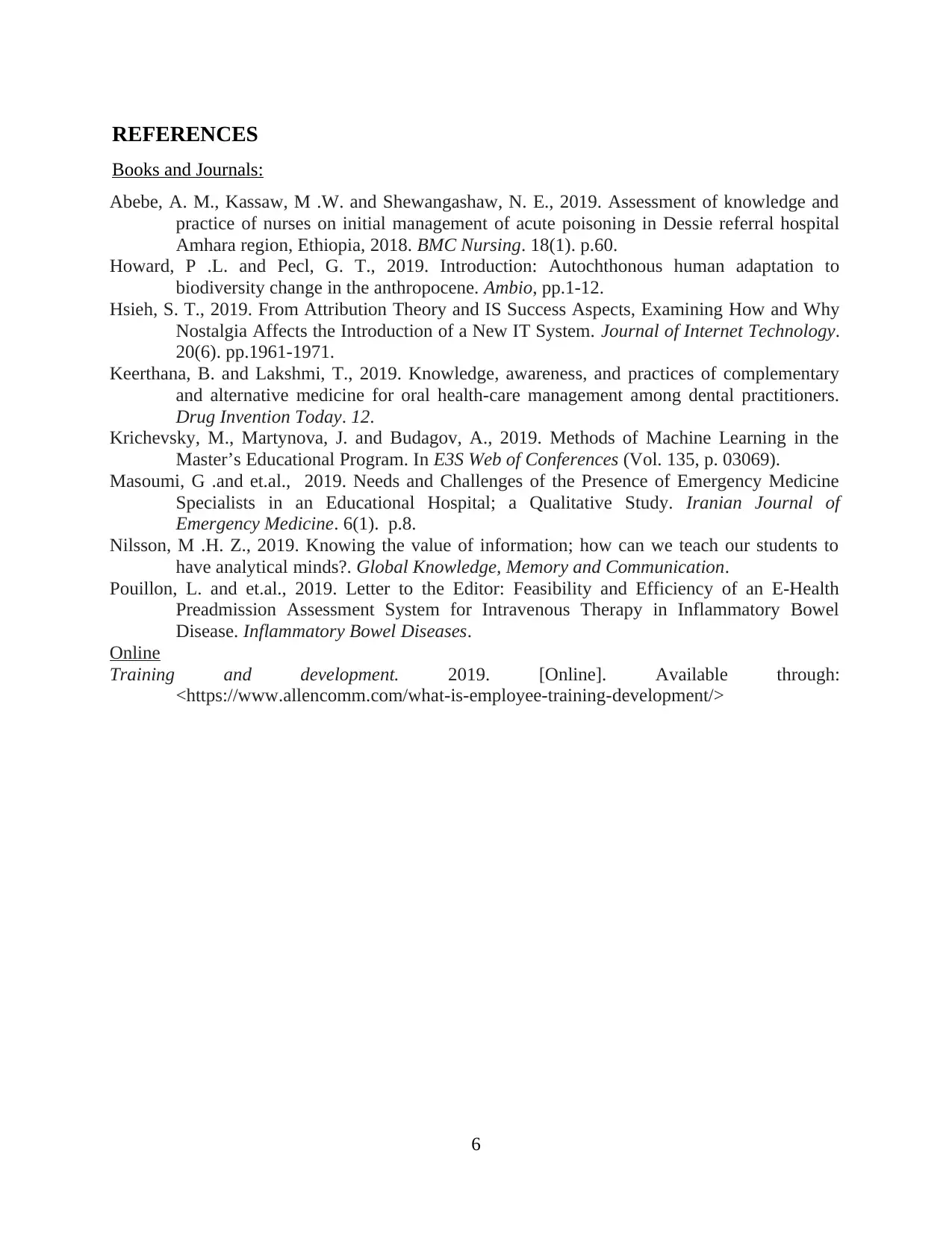
REFERENCES
Books and Journals:
Abebe, A. M., Kassaw, M .W. and Shewangashaw, N. E., 2019. Assessment of knowledge and
practice of nurses on initial management of acute poisoning in Dessie referral hospital
Amhara region, Ethiopia, 2018. BMC Nursing. 18(1). p.60.
Howard, P .L. and Pecl, G. T., 2019. Introduction: Autochthonous human adaptation to
biodiversity change in the anthropocene. Ambio, pp.1-12.
Hsieh, S. T., 2019. From Attribution Theory and IS Success Aspects, Examining How and Why
Nostalgia Affects the Introduction of a New IT System. Journal of Internet Technology.
20(6). pp.1961-1971.
Keerthana, B. and Lakshmi, T., 2019. Knowledge, awareness, and practices of complementary
and alternative medicine for oral health-care management among dental practitioners.
Drug Invention Today. 12.
Krichevsky, M., Martynova, J. and Budagov, A., 2019. Methods of Machine Learning in the
Master’s Educational Program. In E3S Web of Conferences (Vol. 135, p. 03069).
Masoumi, G .and et.al., 2019. Needs and Challenges of the Presence of Emergency Medicine
Specialists in an Educational Hospital; a Qualitative Study. Iranian Journal of
Emergency Medicine. 6(1). p.8.
Nilsson, M .H. Z., 2019. Knowing the value of information; how can we teach our students to
have analytical minds?. Global Knowledge, Memory and Communication.
Pouillon, L. and et.al., 2019. Letter to the Editor: Feasibility and Efficiency of an E-Health
Preadmission Assessment System for Intravenous Therapy in Inflammatory Bowel
Disease. Inflammatory Bowel Diseases.
Online
Training and development. 2019. [Online]. Available through:
<https://www.allencomm.com/what-is-employee-training-development/>
6
Books and Journals:
Abebe, A. M., Kassaw, M .W. and Shewangashaw, N. E., 2019. Assessment of knowledge and
practice of nurses on initial management of acute poisoning in Dessie referral hospital
Amhara region, Ethiopia, 2018. BMC Nursing. 18(1). p.60.
Howard, P .L. and Pecl, G. T., 2019. Introduction: Autochthonous human adaptation to
biodiversity change in the anthropocene. Ambio, pp.1-12.
Hsieh, S. T., 2019. From Attribution Theory and IS Success Aspects, Examining How and Why
Nostalgia Affects the Introduction of a New IT System. Journal of Internet Technology.
20(6). pp.1961-1971.
Keerthana, B. and Lakshmi, T., 2019. Knowledge, awareness, and practices of complementary
and alternative medicine for oral health-care management among dental practitioners.
Drug Invention Today. 12.
Krichevsky, M., Martynova, J. and Budagov, A., 2019. Methods of Machine Learning in the
Master’s Educational Program. In E3S Web of Conferences (Vol. 135, p. 03069).
Masoumi, G .and et.al., 2019. Needs and Challenges of the Presence of Emergency Medicine
Specialists in an Educational Hospital; a Qualitative Study. Iranian Journal of
Emergency Medicine. 6(1). p.8.
Nilsson, M .H. Z., 2019. Knowing the value of information; how can we teach our students to
have analytical minds?. Global Knowledge, Memory and Communication.
Pouillon, L. and et.al., 2019. Letter to the Editor: Feasibility and Efficiency of an E-Health
Preadmission Assessment System for Intravenous Therapy in Inflammatory Bowel
Disease. Inflammatory Bowel Diseases.
Online
Training and development. 2019. [Online]. Available through:
<https://www.allencomm.com/what-is-employee-training-development/>
6
⊘ This is a preview!⊘
Do you want full access?
Subscribe today to unlock all pages.

Trusted by 1+ million students worldwide
1 out of 9
Related Documents
Your All-in-One AI-Powered Toolkit for Academic Success.
+13062052269
info@desklib.com
Available 24*7 on WhatsApp / Email
![[object Object]](/_next/static/media/star-bottom.7253800d.svg)
Unlock your academic potential
Copyright © 2020–2026 A2Z Services. All Rights Reserved. Developed and managed by ZUCOL.




